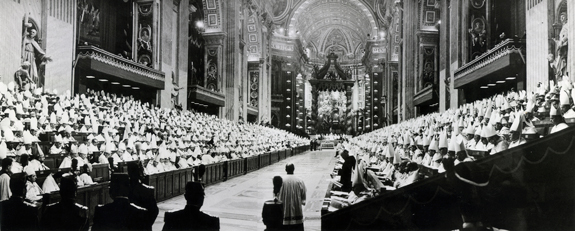
Fifty years ago this coming week, on Oct. 11, 1962, Pope John XXIII convened the Second Vatican Council, gathering some 2,000 bishops from around the world to decide what was needed to renew the Church internally, engage it with the world in new ways and enter into a new era of friendship and dialogue with other Christian churches and other religions.
Vatican II consisted of four sessions, each approximately three months long, held in the years 1962-65.
To commemorate the Council and also to observe the 20th anniversarry of the issuance of the Catechism of the Catholic Church, Pope Benedict XVI has called for a Year of Faith. It begins with a World Synod of Bishops at the Vatican and challenges the Church around the world to commit to furthering the New Evangelization of spreading the Gospel message.
In the Brooklyn Diocese, Bishop Nicholas DiMarzio will open the Year of Faith with a Vespers service at St. James Cathedral-Basilica, Downtown Brooklyn, on Thursday evening, Oct. 11, at 7:30 p.m.
Here’s a look at some of the newsworthy societal events that took place the year the Catholic Church prepared for and opened its most significant assembly in modern times:
• Jan. 12: U.S. forces, for the first time, participate in a major combat operation in the Vietnam War.
• Jan. 26: Bishop Joseph Burke of Buffalo, declares Chubby Checker’s “The Twist” lewd and bans it from Catholic schools.
• Feb. 7: President John F. Kennedy prohibits all trade with Cuba, except food and drugs.
• Feb. 26: U.S. Supreme Court disallows race separation on public transportation.
• March 1: First Kmart opens in Garden City, Mich.
• March 2: President John F. Kennedy announces U.S. will resume above-ground nuclear testing.
• March 27: Archbishop Joseph Rummel ends racial segregation in the New Orleans Catholic school system.
• March 31: Cesar Chavez and Dolores Huerta co-found the United Farm Workers.
• April 9: “West Side Story” wins Academy Award for best picture.
• April 24: Massachusetts Institute of Technology achieves the first trans-Atlantic relay of a television signal via satellite.
• April 25: U.S. Ranger spacecraft crash-lands on the moon.
• May 25: AFL-CIO endorses union drive for 35-hour workweek.
• June 25: Supreme Court rules that the use of a state-written prayer in New York public schools is unconstitutional.
• July 23: Jackie Robinson becomes first African-American inducted into the National Baseball Hall of Fame.
• July 27: The Rev. Martin Luther King Jr. is jailed in Albany, Ga., after demonstrating against segregation there.
• Aug 5: Nelson Mandela is arrested for incitement and illegally leaving South Africa.
• Sept. 30: James Meredith becomes first black student at the University of Mississippi.
• Oct. 5: The Beatles release their first single, “Love Me Do,” in the United Kingdom.
• Oct. 11: Pope John XXIII opens the first session of the Second Vatican Council.
• Oct. 18: American and British researchers win the Nobel Prize for medicine and physiology for determining the double-helix molecular structure of DNA.
• Oct. 22: President Kennedy announces that missile bases discovered in Cuba had the potential to attack the U.S. with nuclear warheads.
• Oct. 28: Soviet leader Nikita Khrushchev orders the dismantling of Soviet missile bases in Cuba.
• Nov. 3: The term “personal computer” is first mentioned by the media. It was used in an article by The New York Times.
• Nov. 20: President Kennedy signs executive order barring religious or racial discrimination in federal housing programs.
• Dec. 23: Cuba starts returning more U.S. prisoners from the 1961 Bay of Pigs invasion.
